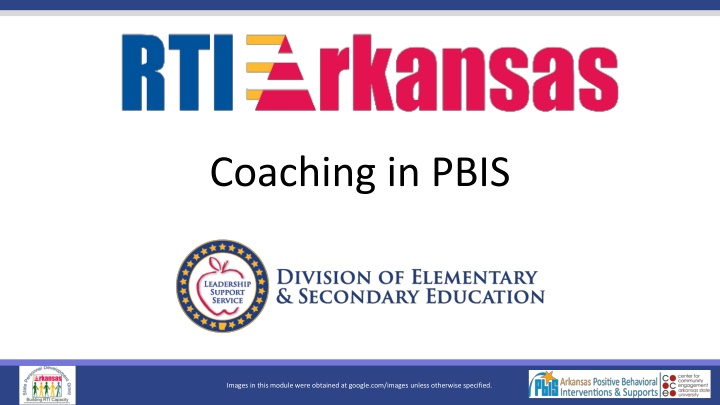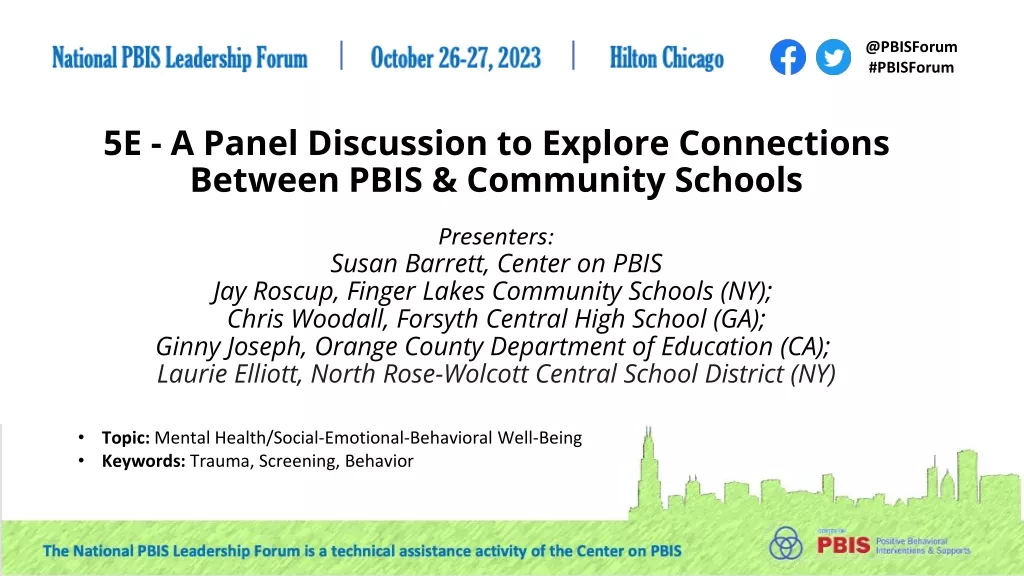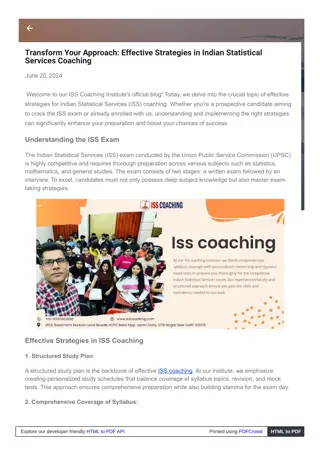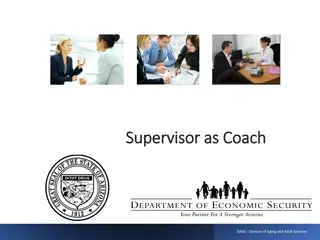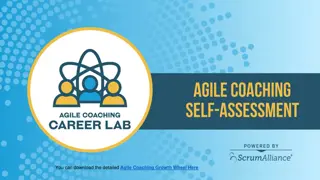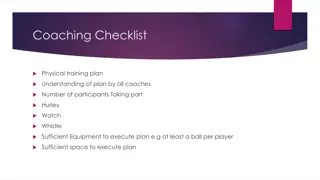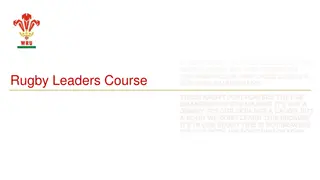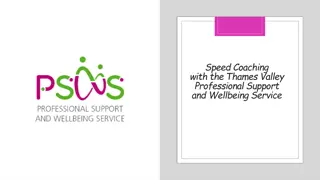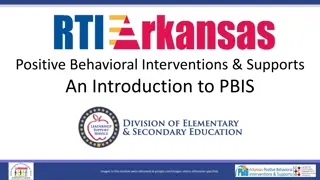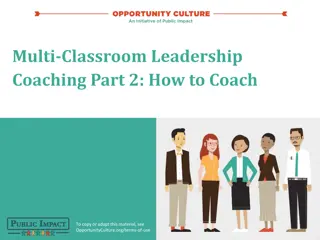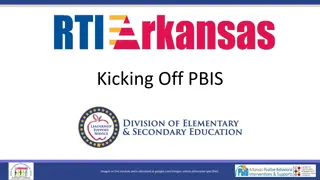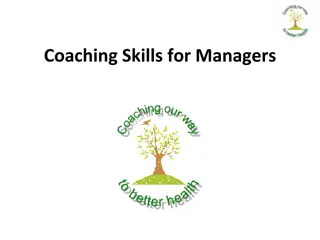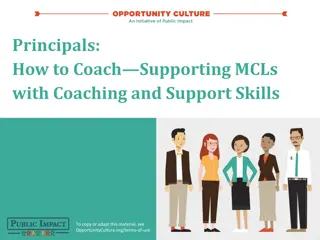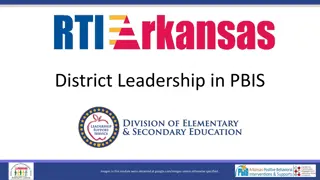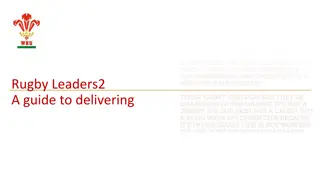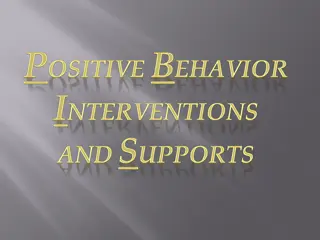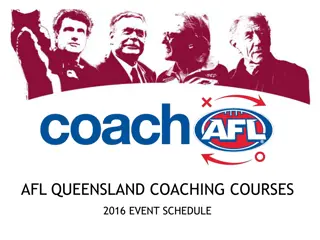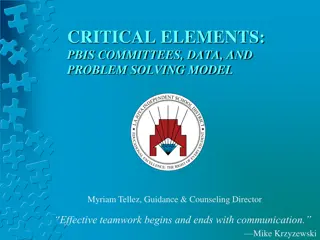Comprehensive Guide to Effective Coaching in PBIS Modules
This module delves into the importance of coaching in PBIS, covering topics such as coaching skills, guiding questions, responsibilities, and qualifications. It emphasizes the key reasons for having a coach, the investments in coaching, outcomes of coaching, and guiding principles for effective coaching. The module also discusses what a coach embodies, the phases of coaching, and the training outcomes related to training components. Overall, it provides insights into building local capacity, maximizing competence, and achieving valued outcomes through coaching in PBIS.
Download Presentation

Please find below an Image/Link to download the presentation.
The content on the website is provided AS IS for your information and personal use only. It may not be sold, licensed, or shared on other websites without obtaining consent from the author.If you encounter any issues during the download, it is possible that the publisher has removed the file from their server.
You are allowed to download the files provided on this website for personal or commercial use, subject to the condition that they are used lawfully. All files are the property of their respective owners.
The content on the website is provided AS IS for your information and personal use only. It may not be sold, licensed, or shared on other websites without obtaining consent from the author.
E N D
Presentation Transcript
Coaching in PBIS Images in this module were obtained at google.com/images unless otherwise specified.
Context Why have a coach? Coaching skills Guiding questions Responsibilities & qualifications Phases of coaching
Why Invest In Coaching? Ensures fidelity of implementation Ensures fidelity of interventions Ensures systems are in place Provides staff with an onsite resource
Coaching Coaching is done By a person with credibility & experience After initial training On-site, in real time Repeatedly, as needed
Training Outcomes Related to Training Components Training Outcomes Training Components Knowledge of Content Classroom Application Skill Implementation Presentation/ Lecture 10% 5% 0% Plus Demonstration 30% 20% 0% Plus Practice 60% 60% 5% Plus Coaching/ Admin Support Data Feedback 95% 95% 95% Joyce & Showers, 2002
Guiding Principles For Effective Coaching Build local capacity Maximize current competence Focus on valued outcomes Emphasize accountability Pre-correct for success Build credibility through Consistency Competence with behavioral principles/practices Relationships Time investment
Outcomes Of Coaching Fluency with trained skills Adaptation of skills locally Rapid redirection from misapplications Increased fidelity of overall implementation Improved sustainability
What Is A Coach? Supporter Partner Resource Liaison Facilitator
Effective Communication Skills Active listening Summarizing Questioning Empathizing Gaining consensus Actively engaging stakeholders
Commit To Listening Make eye contact Acknowledge Pause before you speak and ask, Will my comment open up or close down this conversation?
Use Words That Are Specific And Positive Use and rather than but Emily I appreciate the way you analyzed our data into precise problem statements before our meeting and your analysis of our data kept our meeting focused.
Example: Constructive Feedback Valerie R. Burton, M.Ed. English/Language Arts Teacher at Jefferson Parish Public Schools
Content Knowledge Skills Philosophy behind Systems change RTI and multi-tiered systems of support PBIS Principles of behavior
Problem Solving Skills (DESE recommends using Judy Elliot s four-step approach shown below)
Communication Skills Do I have necessary communication skills? actively participate? follow through on commitments? Am I collaborative and cooperative? able to adapt to situations?
Communication Skills Contd Do I have the skills to facilitate meetings? collaborate with diverse groups? effectively distribute data? engage in problem solving? conduct trainings?
Content Knowledge Do I understand how to lead to systems change? the critical elements of Tier 1? basic principles of behavior and how to apply them? classroom strategies? Am I familiar with discipline policies and procedures?
Data-Based Problem Solving Do I understand the problem-solving process? Can I facilitate the problem-solving process? Do I have the skills to analyze behavior data? select evidence-based interventions? evaluate implementation fidelity? evaluate student outcomes?
Training & Professional Development Am I able to attend all trainings with the PBIS team? monthly PBIS team meetings? coaching meetings in my district? coaching professional development trainings?
Roles And Responsibilities Facilitation Monitoring Coaching Charles Schultz
Facilitation & Monitoring Create a positive, supportive environment Create & ensure structure in school & team system Facilitate meetings (optional) Monitor action plans, outcomes Network with other district PBIS coaches Serve as liaison between school team and district leadership
Coaching Ensure fidelity of implementation Pass on skills (sustainability) Assist team in gaining expertise in Data analysis Defining measurable outcomes Setting goals to achieve outcomes Developing strategies & activities to reach goals Progress monitoring
Qualifications Understands PBIS essentials in depth Skilled at problem solving & school improvement process Has credible/positive relationships with staff Works collaboratively and in groups Can attend team/district/network meetings & advanced training
Phases Of Coaching Phase 1 Teaching/transfer of new skill set Define roles & tasks; supervise closely Decisions made by coach/facilitator; one-way communication Team will need direction & supervision Adapted from Situational Leadership, Blanchard and Hersey
Phase 2 Coaching: High task focus, high relationship focus Defines roles & tasks, but seeks input More two-way communication Team will need direction & supervision; support & praise; involvement in decisions
Phase 3 Participating/supporting: Low task focus, high relationship focus Coach passes day-to-day decisions to team Decision-making control is more with team Team will not need much direction; bolster their confidence and motivation
Phase 4 Delegating: Low task focus, low relationship focus Coach still involved, but control is with team Team decides how coach is involved Team will be able, willing to work with little supervision, support
Example Tool To Use: Year-at-a-Glance Keep the year organized Tasks categorized: data, systems, practices, communication See example on next slide.
COMMUNICATION WITH STAFF, PARENTS and COMMUNITY Staff kick-off Develop communication to explain PBIS to parents Offer Parents opportunities to help INFORMATION (DATA) PLANNING (SYSTEMS) IMPLEMENTATION (PRACTICES) Month Review prior year s data Establish monthly Team meetings Establish schedule for reporting to & celebrating with staff Plan for kick-offs Conduct staff kick-off Conduct parent kick- off August- before students return Review results of TFI Familiarize yourself with the Tiered Fidelity Inventory (TFI) Take pictures for stakeholder communication Conduct student kick- off Administer kick-off evaluation survey Conduct school-wide celebration Send out good news stories to media August - 1st week of school
Sustainability Be honest about issues. Concentrate on precise problems. Have clear, coherent discipline procedures. Help the team be more efficient and effective. Integrate coaching into key job descriptions. Recommit to PBIS every year!
Do It With Fidelity! Tiered Fidelity Inventory (TFI) Efficient, valid index of extent to which PBIS core features are in place Section 1.1 Team Composition
1.1 Team Composition Scoring Criteria 0 = Not implemented 1 = Partially implemented 2 = Fully implemented 0 = Tier I team does not exist or does not include coordinator, school administrator, or individuals with applied behavioral expertise Feature Data Sources School organizational chart Tier I team meeting minutes 1.1 Team Composition: Team Composition: Tier I team includes a Tier I systems coordinator, a school administrator, a family member, and individuals able to provide (a) applied behavioral expertise, (b) coaching expertise, (c) knowledge of student academic and behavior patterns, (d) knowledge about the operations of the school across grade levels and programs, and for high schools, (e) student representation. 1 = Tier I team exists, but does not include all identified roles or attendance of these members is below 80% Main Idea: Teams need people with multiple skills and perspectives to implement PBIS well. 2 = Tier I team exists with coordinator, administrator, and all identified roles represented, AND attendance of all roles is at or above 80%
Summary Coaches need to build their skills and fluency. guide their team in building skills and fluency. phase themselves out, but stay available. stay organized! Create a schedule for the year.
Resources Resources for Coaches & Trainers at OSEP Technical Assistance Center (pbis.org): http://www.pbis.org/training/coach-and-trainer Podcast Resources for Coaches (Midwest PBIS Network): http://www.midwestpbis.org/coaches/podcasts
